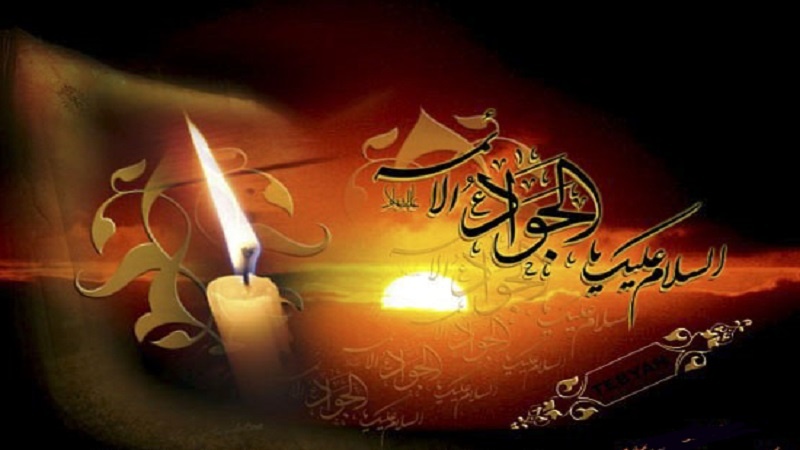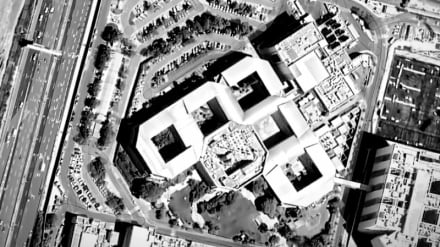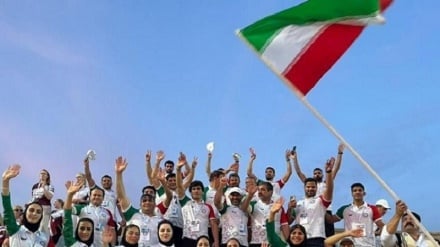Imam Jawad (PBUH) – martyrdom in the prime of youth
Heartfelt condolences to you all on a very doleful day. The last day of the month of Zil-Qa’dah is the martyrdom anniversary of the 9th Infallible Heir of Prophet Mohammad (Blessings of God upon him and his progeny).
He was the Prophet’s namesake and was known by his famous epithets of “Taqi” or the Most Pious One, and “Jawad” or the Most Generous – in both material and spiritual manners. He was martyred in the prime of his youth through a fatal dose of poisoning, and rests in peace in the sprawling twin-domed gold-plated shrine of Kazemain near Baghdad, besides his grandfather, Imam Musa Kazem (PBUH).
Before we present you an exclusive feature on the life and times of the 9th Imam, here is a wonderful saying from him:
“Delay in repentance is self-deceit, long procrastination is confusion, and it is self-destruction to resort to excuses before Allah while insisting on sins by feeling safe from divine punishment of Allah (as ayah 99 of Surah al-A’raaf says) Do the people of the towns feel secure from Our punishment overtaking them at midday while they are playing around?”
The words which you heard are indeed food for thought. These are not the utterances of any ordinary person. As a matter of fact, these bezels of wisdom were bequeathed to us for our guidance by the most perfect and excellent person of his age, whose tragic martyrdom we commemorate every year on the last day of the month of Zi’l-Qa’dah.
Born in 195 AH in Medina, and named Muhammad in honour of his ancestor the Prophet, the 9th Imam needs no introduction. His mother was the pure and pious Nubian lady named Sabikat az-Zahab (Gold Ingot).
He was six years old, when his father Imam Reza (AS) was forced to leave his hometown for distant Khorasan in 201 for the city of Marv, the capital of the self-styled Abbasid caliph, Mamoun. It was a painful farewell between father and son, and brought tears to the eyes of the onlookers. It was sure for both that the 8th Imam was destined not to return home to Medina from the long journey, and hence the 9th Imam was already visualizing himself as an orphan at this tender age. Imam Reza (AS) gave due instruction to his close companions regarding his son, making it clear that by God's Will, he was his successor despite his childhood.
When asked by one of his followers: My master, God forbid! If something were to happen (to you in your journey), to whom will authority belong? Imam Reza (AS) replied in a calm and composed manner: “To Abu Ja’far (i.e. his young son)”.
When the surprised questioner indicated that the age of the boy was too young, Imam Reza (AS) said with a smile: “Allah, may He be praised, raised Jesus, son of Mary, as a messenger, a prophet, and bringer of a revealed law (Shari'a), to begin (his mission) when his age was younger than that of (my son) Abu Ja'far.”
Imam Jawad (AS) was thus 8-years old when the mantle of divinely-decreed imamate came to rest on his tender shoulders on the martyrdom of Imam Reza (AS) in Khorasan.
For the next 17 years, the 9th Imam ably discharged his responsibilities despite the gravity of the Abbasid plots, until his untimely martyrdom in 220 AH (835) in Baghdad.
He was martyred through a fatal dose of poisoning in the prime of his youth, at the age of 25 years, by a self-styled caliph who thought that the death of the 9th Imam of the Ahl al-Bayt, would ensure longevity to the rule of the usurper Abbasid regime.
Mu’tasim was utterly wrong and the misdeed he committed against Imam Muhammad at-Taqi al-Jawad (AS), ensured him a lasting place in the infernal flames of hell, while the rich legacy of his victim continues to be alive and invigorating to this day.
The unpardonable crime of Mu’tasim was committed on the threshold of the annual Hajj pilgrimage to holy Mecca, where every year the 9th Imam used to be present in the garb of the “Exemplary Pilgrim” to teach the tenets of Islam to visitors from far and near.
Many still vividly remembered the question that a grey-bearded ideologue of the Mu’tazalite sect, Yahya ibn Aktham had posed over a decade ago to Imam Jawad (AS), who then was a beardless boy. This is not something to feel surprise about, since God Almighty informs us in ayah 12 of Surah Maryam that He gave wisdom to John the Baptist (or Prophet Yahya) while still a boy.
In the same Surah, ayah 30, the Lord Most High also informs us that the Virgin-born Jesus (AS), though still an infant in the cradle, was empowered to speak to the doubting Israelites, about the chastity of his mother and the fact that he was entrusted with a heavenly scripture and prophethood.
Thus, Yahya ibn Aktham, on the instructions of the then caliph, Mamoun, had asked: “What is the atonement for a person who hunts a game while he is dressed in the pilgrimage garb (that is, Ehram).”
This question appears quite simple, especially during the Hajj season when every potential pilgrim tries to acquaint himself/herself with the rules before setting off to Mecca circumambulate the Holy Ka’ba, the symbolic House of the Unseen but Omnipresent Lord.
But the questioner had ulterior motives. He intended to ensnare in the intricacies of legal issues what appeared to him a mere boy. However, to the astonishment of the scholar and the whole court, the lad, Imam Jawad (AS) with composure and wisdom beyond his tender years said:
“Your question is utterly vague and lacks definition. You should first clarify whether the game killed was outside the sanctified area or inside it; whether the hunter was aware of his sin or did so in ignorance; did he kill the game purposely or by mistake; was the hunter a slave or a free man; was he adult or minor, did he commit the sin for the first time or had he done so before; was the hunted game a bird or something else; was it a small animal or a big one; is the sinner sorry for the misdeed or does he insist on it; did he kill it secretly at night or openly during daylight; was he putting on the pilgrimage garb for Hajj or for the Umrah? Unless you clarify and define these aspects, how can you have a definite answer?”
At this reply, Yahya bin Aktham stuttered and couldn’t find any answer to the counter-question posed by the boy-Imam. His claim to knowledge shattered before the whole court, the grey-haired scholar changed his tone and humbly addressed the boy with the words: “O’ son of the Prophet, you know better”.
The admission of inability by the learned doctor of law embarrassed Mamoun and evaporated his dreams of humiliating 9th infallible Heir of the Prophet.
The Imam then obliged by saying:
“If he (the pilgrim) had killed the animal outside the sacred ground and it was winged and large, an atonement of sheep would have been necessary for him. If he had struck it down in the sanctuary, the penalty required of him would be doubled. If he killed a young bird outside the sacred ground, then the atonement of a lamb which had been weaned off milk would have been required of him. If he had killed it in the sanctuary, then he would have been required to sacrifice a lamb and the value of the young bird. As for wild animals, if it was a wild ass, he would have been required to sacrifice a cow. If it was an ostrich, the sacrifice of a camel would be necessary. If it had been a deer, then a sheep would have been necessary. If he had killed any of those in the sanctuary, the penalty would have been doubled.”
Imam Jawad (AS) continued to describe the various penalties for the pilgrim in the state of Ehram to the astonishment of the audience.
Those interested can refer to the book “Kitab al-Irshad” of the famous scholar Sheikh Mufeed, compiled over a thousand years ago.
Mu’tasim also remembered this vivid debate held over a dozen years ago, yet he was so blind to the truth that he forced Imam Jawad (AS) to leave Medina on the threshold of the Hajj pilgrimage and come to his capital Baghdad in Iraq, so as to be under the watchful eyes of the regime.
It was clear Mu’tasim was looking for a pretext to poison the Imam at the first opportunity.
Once a thief was brought before Mu’tasim, and the jurisprudents in his court gave conflicting verdicts, with some saying that the culprit’s hand be severed from the writs, some that it should be cut off from the elbow, while others wanting that the whole arm to be chopped off.
When Mu’tasim turned to the 9th Imam and insisted on his opinion in this regard, the Prophet’s rightful successor said that the mode of Islamic punishment for a habitual thief, according to the genuine laws of the shari’a is that only the four fingers (and that too after due warnings) should be severed, leaving the thumb and the palm intact, since the culprit is after all a human being in need of the mercy of the All-Forgiving God and should not be deprived of the correct way to pray, which requires the touching of 7 organs to the ground including the palms.
After this wise and rational judgement, the malice of the caliph and the court-mullahs increased, and they plotted the murder of Imam Jawad (AS) through poisoning. The caliph, afraid of the popularity of the Imam and fearful of his own flimsy claims to rule the Muslims plotted with his niece – Omm Fazl, the Imam’s treacherous wife – to martyr Imam Jawad (AS) by poisoning his food. He was gleeful with joy as reports reached his palace at regular intervals that the fatal dose of poison was having the desired effects on his innocent victim.
As the husband writhed in acute pain, the traitorous wife stopped the maids and servants from providing any antidote to the venerable descendant of Prophet Muhammad (blessings of God upon him and his progeny).
Today, there is no sign of the graves of the accursed Abbasid, let along their palaces, while Imam Jawad (AS) who reposes in eternal peace beside his grandfather Imam Musa al-Kazem (AS) in the magnificent gold-plated twin-domed mausoleum of Kazemayn continues to rule the hearts and minds of believers all over the world.
AS/ME



